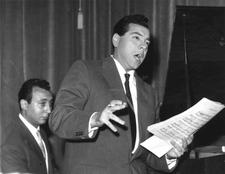When he finally opened the door, I tripped over an extension cord that was dangerously placed at the entrance, and then further annoyed him by sitting down in his armchair. “No you don’t!” he yelled. “You sit over there.” So much for pleasantries.
Of course, had I known then that Lanza had abruptly terminated his association with Baron after the latter had demanded a sizeable percentage of his future earnings, then I probably wouldn’t have gone near the man. For as it turned out, after 23 years he still hadn’t forgiven Lanza, and he lost no time that day in slamming him. “Ha! The man couldn’t read music!” “Del Monaco was better!” “Lanza wasn’t a tenor; he was a baritone.” Was Mario an intelligent person? I asked him. Baron: “You’re asking me if a man who screwed up his career was intelligent?!” And so forth. He even criticized Lanza’s fondness for driving his children to Rome’s Fiumicino Airport in his Volkswagen just to watch airplanes taking off and landing. “That man got a kick out of the damnedest things!” he declared. When I tried to explain—--in rather poor Italian—--that a famous tenor and his family had once lived there, and that I only wanted to look inside the gate, he ordered me to leave at once. “There’s no Lanza here!” he said. But the story had a happy ending. Across the road were two young-ish Italian men guarding what I seem to recall was the Iranian Embassy. They were curious to know what all the fuss was about, and when I mentioned the name “Mario Lanza”, they became surprisingly excited, even singing to me while waving around their guns at the same time. It was a surreal moment.
On my next visit to Rome in 1986, I discovered that Baron and Ferrara were no longer in the Rome telephone directory. (I later learned that Ferrara had died the previous year.) However, the popular conductor-arranger Carlo Savina, who had worked with Lanza on his final movie and arranged some of the songs on the great “Mario!” album, was listed and so I called him. What a difference! Savina was as glowing about Lanza as Baron had been damning. After praising Mario’s voice as “unica” (unique), he went on to speak movingly about the man he had considered “tanto dolce” (so sweet). He recalled a certain sadness in Lanza’s character, but he described him as a man of great heart who had put his very soul into his singing. Interpretive Genius And that, I feel, is the essence of Lanza’s interpretive genius. Whether he’s singing about “the angel glow that lights a star” on his sublime MGM recording of "All the Things You Are" or denouncing the French aristocracy on his 1950 Improvviso from Andrea Chénier, the words are everything to him.
Then there’s the instrument itself: that glorious lirico spinto sound, effortlessly produced throughout its registers, with its unique colour and undeniably sensual quality. To quote music critic Henry Foley, Lanza’s timbre is one that many singers “would kill for.”
As a singer, admittedly, Mario Lanza wasn’t always at the top of his game; the ups and downs of his life saw to that and unquestionably made the quality of his output variable at times. It’s also no secret that even on some of his greatest recordings, stylistic subtlety and musical perfection occasionally eluded him. But as Lindsay Perigo once observed of such criticism, “A diamond is still a diamond -- and a lot more interesting than a polished pebble.”
| |

